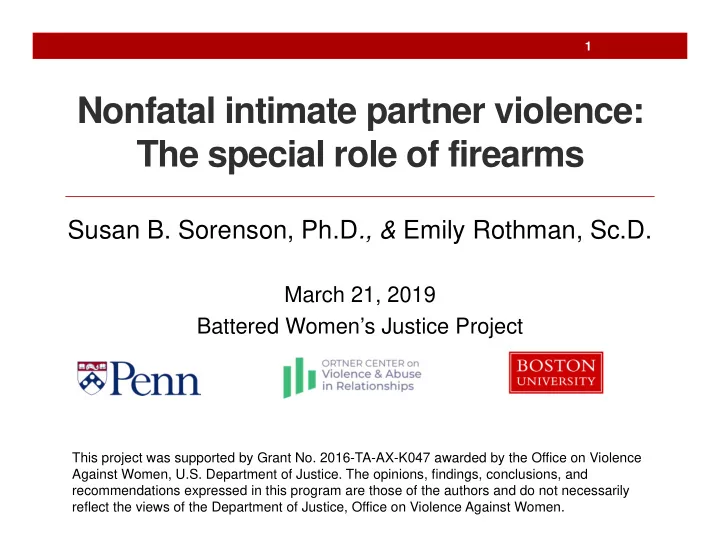

1 Nonfatal intimate partner violence: The special role of firearms Susan B. Sorenson, Ph.D ., & Emily Rothman, Sc.D. March 21, 2019 Battered Women’s Justice Project This project was supported by Grant No. 2016-TA-AX-K047 awarded by the Office on Violence Against Women, U.S. Department of Justice. The opinions, findings, conclusions, and recommendations expressed in this program are those of the authors and do not necessarily reflect the views of the Department of Justice, Office on Violence Against Women.
2 Key points More than survival: the “real world” for women 1. Quick review of IPH (homicide) & guns 2. What’s new: nonfatal IPV & guns 3. Information & action take-aways
3 Quick review of IPH (homicide) • Good news: general downward trend • Bad news: still many deaths and mostly women FBI, UCR Supplemental Homicide Reports • Homicide risk highest when ending the relationship Wilson & Daly, Violence & Victims, 1993
4 Quick review of IPH & guns • Women are ~2.5 times as likely to be shot and killed by a male intimate as shot, stabbed, strangled, beaten to death or killed in any other way by a stranger Kellermann & Mercy, Journal of Trauma, 1992; Sorenson, 2006 • Handguns are weapon of choice Kellermann & Mercy, Journal of Trauma, 1992; Sorenson, 2006 • Guns are risk factor for IPH for abused women Campbell et al., AJPH, 2003
5 What’s new / next • Expand focus to include nonfatal use • Victim reports • Batterer reports • Population & service implications
6 Victim reports: Some previous research • Shelters • 39% of partners had a firearm • Firearm was used against the woman: 65% Sorenson & Wiebe, 2004 • DVROs • Firearm used against the woman: 16-24% Moracco et al., 2006; Sorenson & Vittes, 2006; Sullivan & Weiss, 2017
7 Victim reports: Philadelphia DV calls • Ewre Domestic Violence Agencies (DV-4) District Attorney’s Office Women’s Law Project John & Laura Arnold Foundation New Venture Fund
8 IPV in Philadelphia, 2013 35,413 police-responded nonfatal incidents Weapon use How gun was used No weapon Threatened Body NG weapon Shot or Gun pistol whipped Other Sorenson, Journal of Women’s Health, 2017
9 Scene, % 80.0 70.0 60.0 50.0 No weapon 40.0 Body NG weapon 30.0 Gun 20.0 10.0 0.0 Furniture in Property damage Blood Offender fled disarray
10 Offender behavior, % 70.0 60.0 50.0 40.0 Bodily weapon Other weapon 30.0 Gun 20.0 10.0 0.0 Shove Grabbed Pulled hair Slapped Punched Kicked Strangled
11 Offender behavior, % 80.0 70.0 60.0 50.0 No weapon 40.0 Bodily weapon Other weapon Gun 30.0 20.0 10.0 0.0 Threw objects Dam prop Stalked Threatened Viol PFA
12 Victim presentation, % 70.0 60.0 50.0 40.0 No weapon 30.0 Body NG weapon 20.0 Gun 10.0 0.0
13 Responses to coercion • Cognitive appraisal of threat signaling credible risk • Compliance or resistance • Fear arousal
14 “The moment he put it to my head, my whole life changed.” • https://www.youtube.com/watch?v=y4g4z041GhI
15 Use of Guns to Threaten Intimate Partners by Men Enrolled in Batterer Intervention Rothman, Hemenway, Miller, & Azrael, JAMWA , (2005) N=8,529 male clients of MA programs
16 The many ways to threaten with a gun • Talking about the fact that they own a gun • Threatening to shoot the gun • Showing the gun to the victim • Pistol-whipping • Shooting at something other than the victim, or the victim • Target practice in the backyard • Taking a child to target practice • Keeping posters or other gun-related memorabilia visible throughout the house
17 Threat questions asked • Have you ever threatened to use a firearm against an intimate partner without actually displaying the firearm? • Have you ever handled, cleaned, loaded, or displayed a firearm during an argument with a partner or ex-partner? • Have you ever threatened to use a firearm against a person or thing an intimate partner cared about (family member, pet, friend, or object) without actually displaying a firearm? • Have you ever shot a gun during an argument with a partner or ex-partner?
18 Results Gun-ownership past 3 years: 7%
19 Results Gun-ownership past 3 years: 7% non-gun-owners gun-owners Made a gun-threat: 12% 2%
20 Results Gun-ownership past 3 years: 7% non-gun-owners gun-owners Made a gun-threat: 12% 2% Made multiple gun-threats: 46%
21 Results Gun-ownership past 3 years: 7% non-gun-owners gun-owners Made a gun-threat: 12% 2% Made multiple gun-threats: 46% Knife threats were also more common among gun-owners as compared to non-gun owners
22 Implications • Abusers and guns are a bad combination Violence Against Women Act (VAWA) Lautenberg Amendment • Policy evaluation Some assessment of implementation and enforcement necessary • Future Boyfriend loophole “Smart” guns
23 Thinking beyond service populations Tjaden P, Thoennes N. Findings from National Violence Against Women Survey. NIJ & CDC, 2000.
24 Weapon use in nonfatal IPV, U.S., lifetime, % Women Men Gun •threatened with 3.5 0.4 •used against 0.7 0.1
25 Weapon use in nonfatal IPV, U.S., lifetime, % Women Men Gun •threatened with 3.5 0.4 •used against 0.7 0.1 Knife •threatened with 2.8 1.6 •used against 0.9 0.8
26 If those numbers hold • ~4.5M women alive today have had an intimate partner threaten them with a gun • ~1M have been shot or shot at by a partner
27 Women who purchase guns Are at increased risk of suicide and homicide. • Risk for both is greater for women than for men. • Lasts for at least 6 years. Wintemute et al. NEJM, 1999. No evidence that gun owners are more distressed or disturbed than non-owners; but alcohol misuse higher. Sorenson & Vittes, Evaluation Review, 2008; Wintemute , Preventive Medicine, 2015; Ladapo et al., Academic Pediatrics, 2016.
28 What was new to you? Information takeaways
29 What to do? Action takeaways
30 Conclusion Must address the role of guns in women’s lives as well as their deaths.
Recommend
More recommend